The King of Vodka (29 page)
Authors: Linda Himelstein

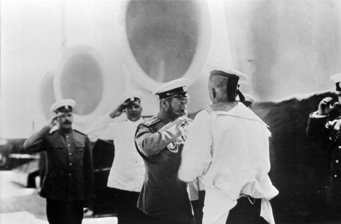
Tsar Nikolay II, Russia's last tsar, is greeted on a military ship with a small glass of vodka during a routine visit.
Source: M. Zolotarev.
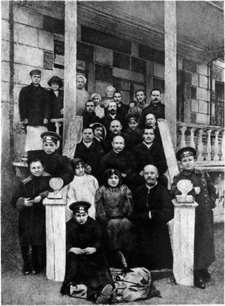
Wounded soldiers being cared for at Smirnov's dacha during World War I. Several Smirnov properties were turned into makeshift hospitals during the war.
Source: M. Zolotarev.
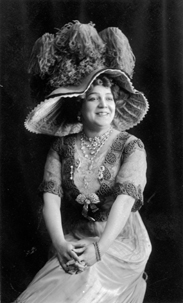
Valentina Piontkovskaya, a famous operetta star who was Vladimir Smirnov's lover and companion before and after the revolution. With Vladimir, she fled Russia in 1919.
Source: Bakhrushin Museum.
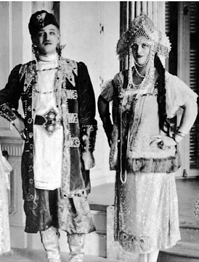
Vladimir Smirnov and his third wife, Tatiana Maksheyeva, in boyar costumes. Tatiana sent the photo to her brother in Estonia on December 29, 1926. A note on the back of the photo describes the difficulty of life in France.
Source: Vadim Maksheyev.
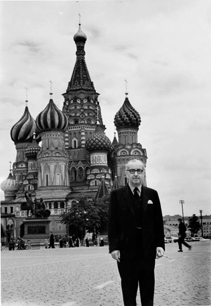
Rudolph Kunett, a Russian émigré who purchased a license from Vladimir Smirnov in 1933 to market Smirnoff vodka in the United States. He is pictured here in front of St. Basil's Cathedral in Red Square on a visit in 1978.
Source: Diageo.
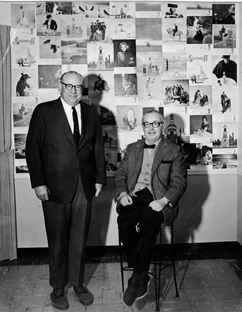
Rudolph Kunett, seated, sold his interest in the Smirnoff franchise in 1939 to John Martin, then president of Heublein, a company based in Hartford, Connecticut.
Source: Diageo.
Still, the state got the message. It took concrete steps to demonstrate that it was not only taking the alcohol problem seriously but that it was also looking for solutions. At the urging of the conservative yet reform-minded prime minister Pyotr Stolypin, the state backed the First All-Russian Congress Against Drunkenness. It was to be a series of public meetings that would air the viewpoints of numerous factions, including doctors, academics, and women's groups. The Social Democratic Party also waded into the debate, urging its members to participate in the public meetings in order to “tie the private question of alcoholism with the general aims and tasks of the workers' movement.”
24
The congress met in December 1909 and then again in January of the following year, fueling the aspirations of temperance advocates, which were moving from promoting a curb on drinking to an outright ban.
This trend complicated Vladimir's personal makeover. The more enlightened and incensed Russians became about their alcohol dependency, the more vilified the state and its vodka makers became. Vladimir persisted anyway, immersing himself in the beauty of St. Petersburg and in the love of Valentina. The two traveled together often during this time, both domestically and abroad. They headed to locales for weeks or even months at a time so Valentina could appear in productions and solidify her growing fame.
*
As for Vladimir's brother, Pyotr Petrovich, the monopoly debates dovetailed with his agenda. It was beginning to look
as if it would be only a matter of time before the vodka monopoly vanished, a victim of anti-tsarist, anti-state propaganda. With careful planning, maybe Pyotr would be able to regain his father's former dominance. Pyotr was on the brink of landing the prestigious title of purveyor to the king of Spain. At home, advertisements touting Smirnov's cognacs, grape wines, and flavored liqueurs seemed to be having their intended effect as Smirnov captured a greater share of the market. The trick for Pyotr was to keep the public rhetoric focused on the state and its vodka monopoly. He could not allow it to mushroom into a referendum against the entire liquor industry, or worse, into talk of prohibition.
The king of vodka's oldest son might have had the skills and cunning to pull off such a feat, if only death had not gotten in the way.
Sudden Chaos
P
yotr Petrovich Smirnov died unexpectedly on April 25, 1910 “after a short but severe illness.”
1
He was just forty-two years old. His passing was not a national event like that following his father's death, but it was noteworthy and, in some very tangible ways, much more consequential. The younger Pyotr's death was like a falling domino, the first in a series of occurrences that tore into the heart of the Smirnov family and crippled the vodka firm. No one had been prepared for the void he left. It had all happened too fast.
Pyotr had been a community and business leader, a man well known, well respected, and well liked. He had possessed and practiced his father's winning combination: a quick mind and an uncanny ability to appear conventional while quietly blazing new trails. Thousands of people turned out for his funeral and burial. Colorful wreaths piled high on his casket, as mourners expressed condolences to his widow, Eugeniya, and their five children. Tributes appeared in leading publications. Most
emphasized his charitable work and business savvy, praising Smirnov's son for his inventiveness and foresight. Compatriots from his industry were particularly saddened by Pyotr's death, sensing that they had lost one of their most determined and effective advocates.
A publication representing the liquor and food trades summed it up best.
At the funeral were thousands of people. Those crowds of people, who came to bury Pyotr Petrovich, knew whom they had lost. They knew that the heart that had stopped beating was that of a responsible, gentle, and kind man, always going to the aid of those laboring and burdened. Shelters, almshouses, and various schools knew that the most fervent guardian and protector had gone away. Merchants and industrialists, gathered in so great a number, knew that already there was no brighter and more energetic defender of their interests and needs. If the unfortunate and laboring felt a frightening loss, an even bigger loss was felt by industry and trade, having lost their bright representative. Home industry is struggling through heavy years, especially those branches to which Pyotr Smirnov stood closestâthat is the food and drink business.
Pyotr Petrovich was not only a man of words. He was mainly a man of business. He not only spoke but he also acted. Words for him did not walk a separate path from business. In particular, the deceased was unsatisfied with the state wine [vodka] monopoly. He understood that the monopolistic trade of wine [vodka] brings frightening damage both to the population and to closely adjoined branches of industry. He hotly fought for the destruction of the state wine [vodka] trade. Any project in this direction met with his special attentionâ¦. Recalling his
joyous memory, it is impossible not to say: Sleep peacefully! That work which you did in the span of your whole life will be carried onâ¦. There will come a time when this work will yield its results.”
2
That time never came. Pyotr's death left the spirits industry without one of its most outspoken defenders. No one stepped in to galvanize the sector the way he had. Indeed, the passion for its anti-monopoly crusade seemed to have withered, overrun by an increasingly vibrant and vigilant temperance movement. The anti-alcohol campaign had matured and strengthened. Its rants about the evils of liquor had grown more confident, more scientific, and more reasoned. Its endgame had broadened, too, escalating beyond demands for a repeal of the monopoly or a reduction in consumption into talk of complete prohibition.
This onslaught stemmed in good part from the deteriorating condition of society and a general acceptance among Russians that alcoholism was a leading contributor. This situation was a chief topic of the day, its discussion no longer a sign of rebellion. The public's grave concern was reflected regularly in articles critical of the state's liquor policies and the tsar himself. According to
Novoye Vremya
, a large-circulation newspaper published twice a day in St. Petersburg: “Everybody speaks about alcoholism now. The state could easily end alcoholism thanks to the monopoly, as the alcohol income makes up one-quarter of our budget.”
3
Another article was more dramatic in its assessment, charging that “Russia is dying because of alcohol.”
4
The press devoted buckets of ink to this topic. At one point, more than thirty different journals were dedicated solely to the coverage of temperance.
5
Another factor boosting the anti-alcohol movement turned out to be the death of Lev Tolstoy in 1910, less than seven months after Pyotr Petrovich died. Tolstoy's vehement opposition to the state's alcohol policies was well documented. He had railed for
decades against the ills of liquor, one of the few to emphasize that it was not a problem plaguing only the poorest segments of society. “The ugliness and, above all, the meaninglessness of our life stems primarily from the constant state of drunkenness in which the majority of our people of all classes, callings, and positions are now to be found,” Tolstoy wrote toward the end of his life.
6
The Commission on the Question of Drunkenness called a special meeting to commemorate Tolstoy's passing and to celebrate his temperance principles. His death sparked numerous demonstrations among student activists and others throughout Russia. They marched against everything from poor working conditions to the death penalty. One protest drew 10,000 people to the streets of St. Petersburg, disrupting the flow of trams and pedestrian walkways.
Without Pyotr's leadership, the Smirnovs struggled to fend off the tidal wave headed their way. His untimely passing left the company defenseless in a sense. His will, hastily composed just three days before his death, bequeathed all his property and the rights to the remnants of his father's business solely to his wife, Eugeniya Ilyinichna Smirnova. She would have use of the family's real estate throughout her lifetime and was unilaterally responsible for the guardianship of their children, each of whom was to receive 50,000 rubles (more than $580,000 today) when they reached the age of twenty-five. Thus, Eugeniya became the chief executive and solitary owner of Smirnov's liquor firm.
Eugeniya had never shown any real interest in her husband's business, nor did she have any experience that would have prepared her for her new responsibilities. In fact, when Pyotr Petrovich appointed his wife in 1905 as his partner in the company, he did so as a formality to retain his status as a trading house. He had never intended for Eugeniya to work there, much less serve as its top executive. Like most women in high society, Eugeniya was the product of a private boarding school, a girl born and bred to assume her rightful place among the elite.
She loved traveling abroad and was a regular fixture at some of the grandest hotels in Europe. Her grandson described her as “a woman who didn't have a head for business, hadn't been involved in business matters. She was as free as a bird. That's how she had spent her life.”
7
Her daughters were being groomed in much the same way. “Their prime concern was spending money, traveling,” Eugeniya's grandson later recalled.
8
Eugeniya, a widow at just forty-one, was not prepared to spearhead the company's next steps, particularly in the midst of such a turbulent environment. Although many Smirnov loyalists were still employed by the vodka factory, within a few short months Eugeniya tapped her eldest son, Arseniy, to be her surrogate regarding family business matters when she was otherwise engaged or unavailable. It was an odd, reckless choice for her to make, primarily because her son was sixteen years old. A special amendment to the bylaws of the company had to be drafted just to allow Arseniy to assume his new role.
9
What's more, he was not mature enough to grasp the depth of the struggle facing the vodka industry nor astute enough to manage critical relations with key business contacts. These weaknesses, and the irreparable damage that resulted from them, became apparent almost immediately.
Arseniy learned the hard way how pivotal his father's dedication and personal stature had been in preserving the financial health of the Smirnov's vodka business and its broader interests. In 1909, the last full year Pyotr Petrovich ran the business, it employed five hundred people and grossed 7 million rubles.
10
That was down considerably from its high of 19.7 million rubles in 1897 but still quite respectable in light of the monopoly and the contentious political landscape. Pyotr had done it in part by stepping up production of flavored vodkas, grape wines, and cognacs, and exporting greater proportions of vodka. In addition, he solidified his place as an industry ambassador of sorts, helping to launch and then pilot the Central Bureau. Competitors
and allies alike held Pyotr in high regard and treated him with great deference.
The company had claimed for years that it had a right to display four state coats of arms on Smirnov's labels and in advertisements. But members of the Central Bureau questioned whether this kind of marketing was appropriate, particularly because it was Pyotr Petrovich's father who had earned the coveted awards and accolades. They argued that these rights could not be passed to a son who had eight years earlier dissolved the original business and formed another. His rivals had precedent on their side. Indeed, it was Pyotr Arsenievich Smirnov himself who had successfully argued that the inheritor of the Popov Trading House could not use a state coat of arms earned by the founder.
Still, the Central Bureau chose not to go to battle over its gripe. Instead, it approached Pyotr Petrovich directly. After some quiet discussions, the two sides reached an amicable agreement. Pyotr promised to remove one of the coats of arms from his labels and advertisements, conceding that it had been a mistake to use it. In the future, he would use only three. That would have been the end of the matter except that Pyotr died before making good on his bargain. The Central Bureau then followed up with Arseniy, but Pyotr's son repeatedly refused to honor his father's pact. He and other Smirnov managers claimed that the paperwork related to the use of the coats of arms was unavailable. They stalled for time, convinced that they had inherited the right to use the honors. They probably hoped the situation would simply go away, a costly miscalculation, exacerbated by Arseniy's haughty refusal to pay a bill for advertisements his father purchased to run in the Central Bureau's bulletin prior to his death.
Tensions boiled over between the two parties. Former allegiances to Pyotr were exhausted. Now, the Central Bureau concluded, it had no other choice but to take legal action. It filed a
petition with the Ministry of Industry and Trade, which opened an investigation into the Smirnov's use of not one but all four state coats of arms. The Central Bureau contended: “The newly reformed firm Trading House P. Smirnov by law can buy only the movable and immovable property of liquidating enterprises. By no means can it buy distinguishing features, such as a coat of arms granted to the P. A. Smirnov Association. Consequently, the Trading House P. Smirnov has been enjoying up to this time a right not belonging to it, the right to carry on its labels and other such items the coats of arms, medals, and awards.”
11
The Smirnovs fired back that they inherited the hard-earned designations: “We consider ourselves within our rights to use on signs and products four representations of the state coat of arms.”
12
The legal fracas was nasty. The Smirnovs had plenty of sympathizers, some of whom expressed their opinions publicly in periodicals. Industry insiders, especially the Central Bureau, broadcast their views the loudest. They seemed intent on wounding the Smirnovs, bitter over the shabby treatment they received from their former ally's son. Worse, the controversy bled over into the company's most cherished asset, its right to the title of purveyor to the Imperial Court. This distinction was still a coveted and invaluable marketing tool, despite the tsar's sagging public image. Indeed, when one of Smirnov's chief competitors, N. L. Shustov & Sons, received the purveyor title in 1912, it was rumored that Shustov was so anxious to show off his newly elevated status that he trashed all his old labels and replaced them with ones highlighting his award in just one night.
13
Given the gravity of the situation facing the family, it appears that Eugeniya and a more business-minded representative working on her behalf intervened. Arseniy was no longer the point person on this issue, a wise last-minute shift. Eugeniya saved face by getting a temporary license to keep the purveyor title and one state coat of arms. The Ministry stripped the other
three from the Smirnovs in late 1911, a devastating blow to the company.
*
The loss in stature, occurring in tandem with the raging anti-alcohol movement and disarray within Smirnov's management ranks, contributed to an alarming drop in profits. Gross revenue fell by more than 5 million rubles in 1912, and about 150 employees at the warehouse and factory lost their jobs.
14
The Smirnovs suffered from even more negative press when the Shustovs sued the company for trademark infringement. Perhaps smelling blood in the water, the Shustovs claimed that the Smirnovs were copying the name of one of its popular specialty drinks, a cherry-flavored vodka known as
Spotykatch,
a derivative of the Russian word meaning “to stumble.”
15
In point of fact, many vodka makers produced flavored vodkas under the
Spotykatch
moniker; the court threw out the case, concluding that the word could not be trademarked as it was too commonly used to refer to cherry-flavored drinks.
Still, the bad news just kept coming. Relations between Eugeniya and her son Arseniy grew contentious. He had begun to show troubling signs of behavior similar to Nikolay. Arseniy spent money like it was vodka, free-flowing and infinitely available. He overpaid for two homes, which cost him a total of nearly 1 million rubles.
16
He then issued promissory notes in the amount of 150,000 rubles, which returned to him less than 15,000 rubles.
17
No one knows why Arseniy's behavior turned so destructive: it might have been the pressure from the business, the loss of his father, or his absentee mother who, like many aristocrats, left her children in the care of trusted nannies and guardians while she traveled throughout Europe. Regardless, he had to be stopped.